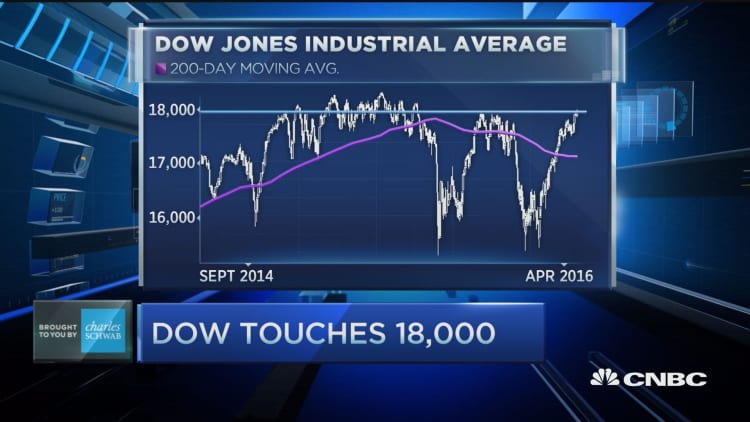
The Dow's break above 18,000 this week could well point the way to further gains.
Opinions on Wall Street certainly appear to be divided on the significance of indices rising above round-numbered levels, such as the 18,000 that the Dow Jones industrial average rose above on Monday. Some say that "psychological importance" is tied to these levels. The thought is that people may be led to buy stocks or to grow marginally more bullish as such a level is exceeded.
Others say that a number like 18,000 is no more meaningful than, say, 17,962 — with the only potential difference being that the former is more easily ballyhooed by the media than the latter.
A look at recent market history, however, would tend to support the former view.
An analysis of the actual significance of round numbers began by isolating the sessions in which the Dow traded above a new thousand-handle level at the high of the day. Then, the performance over the next 10 sessions was compared with the performance of the Dow over an average 10-session period.
It turns out that over the past five years, the Dow rose an average of 0.7 percent in the 10 sessions following the touching of a new -000 level. This compares with the average rise of 0.32 percent across all 10-day periods. The difference in median performances is just as stark, with a rise of 1.01 percent seen after the touching of a new round-numbered level, compared with 0.51 percent across all 10-session periods.
Superior performance following the tapping of round numbers also tends to be seen when 30-day performance is analyzed, as well as when longer or shorter time frames are considered.
| Average Dow performance over... | 10-year | 5-year | 1-year |
|---|---|---|---|
| All 10-day periods | 0.24% | 0.32% | -0.01% |
| 10-day periods after higher -000 level hit | 0.32% | 0.70% | 1.03% |
| All 30-day periods | 0.69% | 0.96% | -0.09% |
| 30-day periods after higher -000 level hit | 0.66% | 1.80% | 0.82% |
The performance is not simply due to an ordinary momentum effect whereby stocks tended to rise after up days, nor because periods following the touching of round numbers have been more volatile in general (they have not been).
There seems to be, instead, something about the capture or recapture of a round number that draws in marginal buyers, and perhaps even grabs the imagination.
The effect is not just isolated to well-publicized round numbers, like the one just hit by the Dow. A 2007 paper found that stocks that closed a given session just above a round number performed better than those that closed just shy of one.
"The use of cognitive reference points [such as round numbers] is one of the more deeply ingrained and unconscious psychological tendencies, and so it may be more persistent even in individuals with financial training and education," authors Edward Johnson, Nicole Bastian Johnson and Devin Shanthikumar ventured.
In short, so-called "psychological importance" can quickly turn into real importance when it leads the mass of investors to adjust their behavior.








